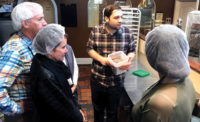Pease’s partners with Chocolate Chocolate Chocolate for production
The Springfield, Ill.-based chocolatier will move 75% of its production to Chocolate Chocolate Chocolate’s St. Louis plant in August.


|
| One Pease's location at S. 6th St and E Washington St., in Springfield, Il. |
After 82 years in central Illinois, Pease’s Candy is heading south — but only partially.
The Springfield, Ill.-based confectioner announced last week it will move 75% of its production to a new St. Louis, Mo. facility owned by Chocolate Chocolate Chocolate Co.
Rob Flesher, owner of Pease’s, says the move will benefit both his company and Chocolate Chocolate Chocolate, which needed more production to fill its brand-new 30,000-sq. ft. plant.
“Like every candy company, the economy has hit us hard,” Flesher says. “We just saw this as an opportunity to improve our position, cut down on some overhead...They are only 90 miles away, so transportation will be a little bit of a cost, but not serious. It seemed like a good fit for everyone.”
Flesher says the chocolatiers and friends first tried to collaborate on a different project three years ago, but they could not reach an agreement. For this project, however, Chocolate Chocolate Chocolate approached Pease’s, and now, production at the Missouri plant is set for mid-August.
Flesher assures, though, that the decision will not affect the chocolate, popcorn, caramels and mints that the Pease family has made for more than a century. Chocolate Chocolate Chocolate purchased some of Pease’s equipment, and Doug Anderson, the company’s production manager for 28 years, will also go to St. Louis to oversee production at the new facility.
“When you’ve got the same guy making the product, the equipment that we’ve been using for years, the same ingredients we’ve used for 100 years, and the fact that Chocolate Chocolate Chocolate is a family-owned business — they put emphasis on quality — I don’t see a difference at all. Just a change of location,” says Flesher, who is a fourth-generation confectioner.
The company’s three retail locations in Springfield will remain open, and one store with a small kitchen will continue to make confections. Nevertheless, Pease’s has gotten some criticism for moving the majority of production from the city it has inhabited for years.
“Everybody who knows the whole story, knows what’s going on, has been very positive,” Flesher says. “From the people in the community who just read a headline and jump to conclusions, it’s been kind of negative. If people would listen and follow the whole story, they would understand what we are doing and realize the product is not going to change. It’s not like we’re laying off a ton of people. It’s nothing like that at all. We’re getting some negative comments, but that was to be expected.”
Though some have taken the production shift as a decline in business, the move will actually allow his company to expand its retail ventures.
“It gives us more of an opportunity to focus on our retail business, because we are not spending so much time on our manufacturing,” Flesher says. “If we have the opportunity to open another store, that’s great. If we just keep the three stores that we’ve got and do things better, that’s great, too.”
Looking for a reprint of this article?
From high-res PDFs to custom plaques, order your copy today!










